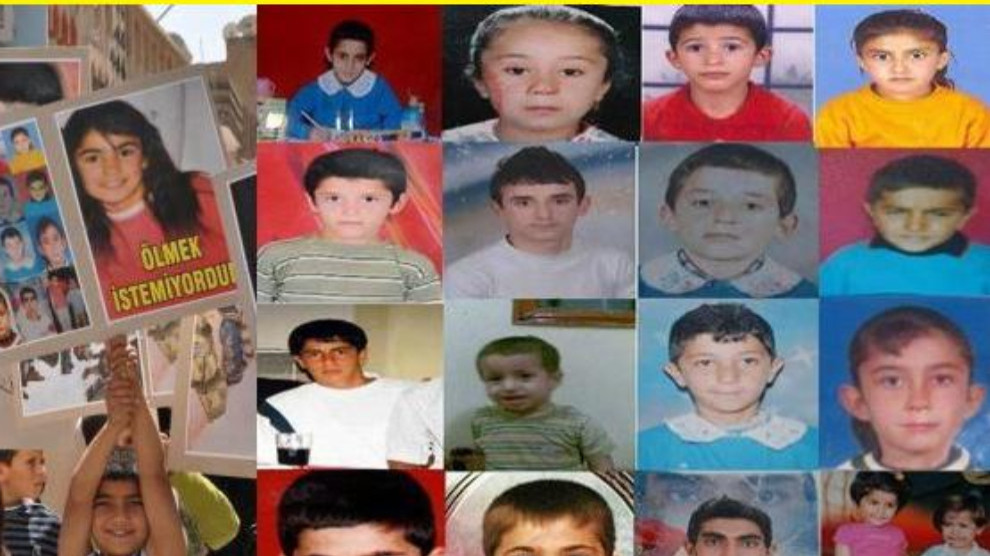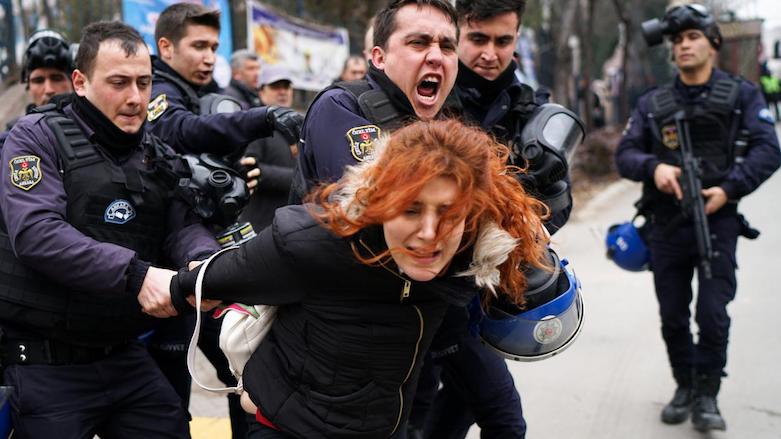
In Kurdish provinces children are not just the target of state forces such as police or soldiers. In 2010, the state took a step which turned “children who were throwing stones” and who were under 15 into “children who were pushed into crime”.
Turkey sadly primes when it comes to violation of children rights. The numbers of rape, children in prison, children working from a very young age, children who lost their lives in conflict zones and children killed by the state’s security forces are high.
In Nusaybin, during the curfew imposed as a measure to counter the coronavirus pandemic, police chased – gun in the air – and catched children playing. An administrative investigation has been filed against the police, but in such cases, after the first public reaction, civil servants are simply going back to their work. When we look at these types of cases and incidents in Turkey we we see that punishments are almost non existent and in fact, often, the officers responsible are given a prize.
Impunity makes children the target of security forces.
Children throwing stones
In Kurdish provinces in particular children are not just the target of state forces such as police or soldiers. In 2010, the state took a step which turned “children who were throwing stones” and who were under 15 into “children who were pushed into crime”.
This meant that children under 15 can undergo trial, while those who killed them often received short sentences or are acquitted.
By 2015, i.e. in the first 13 years of the AKP government, according to the figures of TIHV (Turkish Human Rights Foundation), 241 children were killed while other civil society associations say the figure could be as high as 477 children killed by state forces.
To remind just some of these killings, on 28 December 2011 19 of the 34 people who died in the Roboski massacre were under 18. The IHD Amed Branch in 2019, said that 36 people died, 16 of them children, as a result of the crash of armored vehicles in the last 10 years.
During the curfews in 2015-2016, many children were killed as a result of fire opened from armored vehicles. Bişeng Goran (12), Nidar Sümer (17), Mahmut Bulak (16), Muğdat Ay (12), Cemile Çağırga (10), Tahir Yaramış (35 days), Elif Şimşek (8), Berat Güzel (12), Ramadan Gümüş (14), Hidayet Tek (4), Esra Şalk (2), Müslüm İlhan (8), Enes Erdem (9) to name just a few.
In 2015, Güler Yanalak, 7 months pregnant, was seriously injured in the Cizre district of Şırnak when she was hit by a bullet in the belly. Her baby could not be saved.
In 2015, the 3-month-old Miray was shot when snipers fired into her parants’ homes. Many children were also injured during the curfews.
In the years that followed, the picture reflected in the IHD reports did not change. Children died either because of the fire opened by the security forces, or because of the mines planted by the army, or were tortured in custody.
To add pain to pain most of the trials against those responsible of the killing of children ended without punishment for the culprit or are still going on.
Remembering Uğur Kaymaz
Like the case of Uğur Kaymaz, who was murdered with his father on 21 March 2004 in Kızıltepe (Mardin) and has not ended fairly despite 16 years have passed. All four policemen on trial were acquitted. The acquittal decision was confirmed by the Supreme Court. The European Court of Human Rughts has sentenced Turkey to 140 thousand TL compensation for having infringed the right to life, because of the demands of a new trial the fine was rejected. The file is still in the Constitutional Court.
On 4 May 2017, the brothers Muhammed Yıldırım (7) and Furkan Yıldırım (6), who were sleeping in the hall died when a armored vehicle literally broke down the walls of their house in Silopi.
The trial lasted two years, and at the hearing held on 19 June 2019, the driver of the armored vehicle was sentenced to 2 years and 6 months in prison on charges of “injuring one or more people because of negligence”. The court finally reduced the sentence to 2 years and 1 month and converted it into a fine of 19 thousand Turkish Liras.
Ceylan Önkol died on 28 September 2009 as a result of a mortar shell explosion in Lice. The perpetrators have still not been revealed. The prosecutor’s office issued a confidentiality order on the case. Although the family applied to European Court of Human Rights twice, the Court decided in 2017 that there was no violation.
5 years later (30 April 2014), the Lice public prosecutor’s office put the file in the drawer saying it was not clear who and when put the ammunition there. The family and IHD lawyers sued the Ministry of the Interior, but the Council of State overturned the ruling to pay compensation to the family on 16 May 2019.
The killers of 11-year-old Cemil Çağırga were also not found. He was killed during the curfew and kept in the freezer because his body could not be buried. Like for many other civilians and children killed during the curfews, a decision of non-prosecution was made on the grounds that no perpetrator was found.

